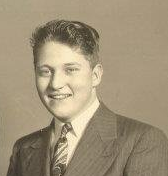I don’t believe my uncle Harold Cline Owen ever had a settled life. His parents divorced when he was a toddler, about the time his baby brother David was born. As a young boy, he and Davey were sent west to live with his father and stepmother. It’s doubtful that he went to school while living in Oregon. He certainly didn’t go to school much once he hit his teens because his kidneys were failing.
It started when he was a little fellow. He and my dad walked
to school in a cold pouring rain. Soaked through, they slogged through the mud.
Harold had to urinate and looked forward to reaching the school’s toilet, but
once he got there, the old school marm, as she was called, punished him for
being late to class. She would not let
him use the lavatory. She made him hold it in and then only let him use the
facilities during lunch. By that time, the boy was in so much pain. He still had
to walk home after school.
A doctor came and said that an infection had set into Harold’s
kidneys and he was also affected by the low temperatures. The word for it is hypothermia.
The young child’s fever spiked with the bacteria that had flourished. Harold
had uremia and nearly died.
Sometimes other kids in the neighborhood would pick on
Harold for being sickly. Harold thought his way out of those predicaments. He didn’t
want to look cowardly so he’d say, “Aw, I could lick all of you. Even my baby
brother could fight you and beat you!” Then just to prove they could, they’d go
after David and knock him around once they caught the boy. David learned how to
throw punches which served him later in life.
After so much family upheaval, traveling from Detroit to
Oregon and back again, and a weakened body, Harold stayed home from school. What was the
use of a formal education if you were going to die anyway?
About 1947 in a little town called Rockwood in Michigan, Harold
lived on a farm with his mother Zona, stepfather Roy and youngest brother
David. The teen had a pig that he’d raised from the time it was a piglet. It
was named Houdini after the famed escape artist. The two played together, spending
the hours like best friends do. He taught Houdini tricks like he would have
taught a dog. Wherever Harold went, Houdini followed, through corn patches,
fields, and along the road. Sometimes Harold would eat out of the field. He
could eat a large onion just like he would an apple. There were other things to
graze on along the way. He’d share the scraps with Houdini as a reward for
sitting, shaking hands (hooves) and other tricks. The months passed. Houdini
was becoming a boar. Harold was losing his sight and wearing glasses.
In the evenings, Houdini would rest in his pen, and Harold
would read. Just because he didn’t go to school didn’t mean Harold couldn’t
read for fun! The two grew together for a year until one day Houdini turned on
his master.
It was sudden and unexpected. Houdini had been escaping his
pen several times a week and going into gardens, snuffling up the ground, then
eating the crops. Usually, the hog would comply and leave with Harold, but not
this time. The ever-growing boar not only bit him, it injured the young man’s
hand deeply. Roy asked his stepson what he wanted to do, since it was his pig.
It was a fair enough question.
“Kill that pig and cook it up!” came Harold’s answer. Roy
slaughtered that hog, a little earlier than the usual season which was
generally October or November. With a dangerous animal, you just don’t wait.
Infection settled into the boy and he was treated as well as he could for it.
Weeks later, Harold was at the kitchen table, his nose in a book. He said, “Could
somebody turn on the lights, I can’t read!”
His mother, Zona said, “They’re already on, Son.” Apparently Harold thought that someone, most likely
David, had turned out the lights as a prank.
“Mother! I can’t see!” he cried, realizing his sight had complete
failed. In the hospital, it was said to be a result of prolonged kidney disease and sudden failure. No doctor
could save the boy.
In the forties, dialysis machines and their role in treating
kidney disease were in their early stages of development. Using one of those
machines might have prolonged Harold’s life, but there were none in Michigan at
that time. Dutch physician Willem Kolff was just beginning his use of very primitive
practical artificial kidneys in the 1940’s.
Doctors Leonard Skeggs and Jack Leonards had a workable system in nearby
Cleveland, Ohio. Neither apparatus was ready for regular use by patients.
On September 21, 1948, less than a day or two after being
struck by blindness, Harold Cline Owen expired from acute Bright’s disease,
most likely exacerbated by infection brought on by the hog attack. At the
time, there was no treatment for Harold’s condition.
He was only eighteen.
